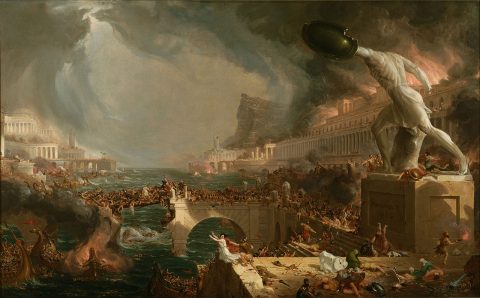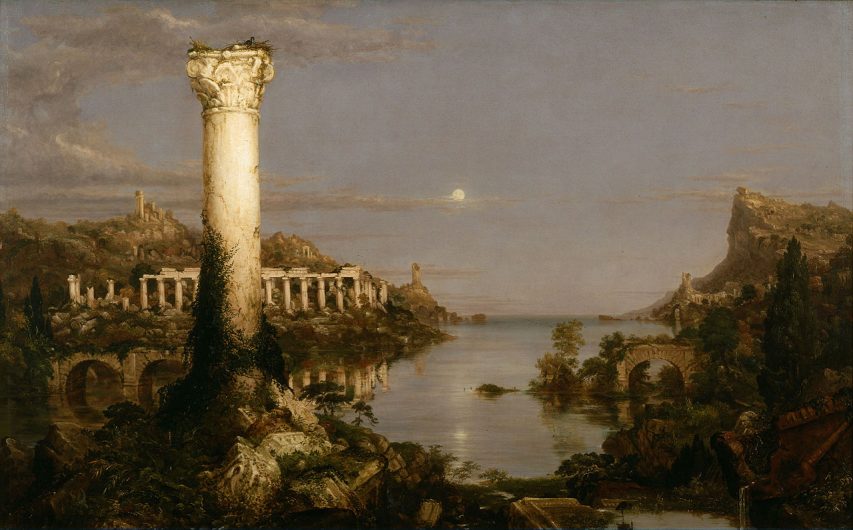At Postcards From Barsoom, John Carter tries to explain the “vibe shift” in western culture:

The Course of Empire – Destruction by Thomas Cole, 1836.
From the New York Historical Society collection via Wikimedia Commons.
Underneath the medical tyranny of COVID, the stolen elections, the Internet censorship, the inflation, the hypermigration, the gender psychosis, the polarized rancor of sexual politics, and all of the rest of the symptoms of our decaying mismanagerial order, a countercurrent has flowed through the deep and hidden places of our collective psyche, hot and slow, like a chthonic river of magma rising implacably to the surface.
It isn’t just frustration with the intolerable imposition of Woke into every aspect of our lives, as though we could reset the clock to 90s liberalism and get fresh again with the Prince of Bel Air. It isn’t just anger at the invasion of our countries by the third world, nor is it limited to impatient disgust with the glossolalic babble of an incompetocracy comprised of credentialed midwits who seem to feel that word-shaped noises confer all the legitimacy they need to misrule our countries into oblivion.
It isn’t purely negative.
There’s a sense, somehow, of hope.
Hope, that after decades in which it seemed that history has stalled, that the culture has been frozen in permafrost, that nothing new could ever really be done again, that Nothing Ever Happens, that the only thing we can look forward to is a long, cold decline into technocratic surveillance, demographic implosion, green energy poverty, and final, irrecoverable collapse … hope that maybe this insipid fate isn’t so inevitable as we thought. Hope, that the building tectonic pressure of those buried psychological forces might finally break through and crack the shell of a dead future.
The sudden birth of artificial intelligence and the renewed enthusiasm for the conquest of space are two very obvious signs of this abrupt return of novelty. This is not a purely positive thing – AI is regarded with anxiety by almost everyone, but it is the raw fact of its sudden transition from science fiction to mundane tool of everyday life that is significant here.
There are other signs of this sense of renewal. The proliferation of self-improvement culture amongst many of the youth, particularly on the Very Online Right. The rise of the digital nomad, a modern re-enactment of the Romantic wanderjahr. The quiet birth of the network state, for instance in the form of Praxis. The renaissance of thoughtful, long-form essays right here on Substack. Surging interest in the religious traditions of our ancestors, whether in the form of Orthodox Christianity or paganism. The transformation of warfare by drones, promising a revolution in military affairs every bit as epochal as the firearm. The rise of a contradictorily global sense of national particularism. The steady refinement of 3D printing technologies.
Trump’s victory in 2024 seems a sure sign of this vibe shift. In a plot arc that could have been lifted straight from the original Star Wars trilogy, Trump brought A New Hope to America – and the world – in 2016; his forces were shattered and scattered to the winds in 2020 when The Empire Struck Back; only for the rebel forces, tempered by the lessons learned in defeat and strengthened with the assistance of new allies, to Return With the Jedi in 2024 and once again blow up the Death Star. This time around, Trump represents not simply the desperate holding action of an underground resistance to granny state totalitarianism, but the coalescence of a new and vigorous counter-elite, as embodied most of all by the ambitious hectobillionaire space lord who built auctoritas by buying the digital public square out from under the Empire so he could shitpoast in peace with the chuds.
Each of these has their good and bad aspects – the point, again, is not to dwell on whether any given development will be to our benefit or our detriment. As always, the ramification of second and third-order effects through the social order will result in both advantage and disadvantage. The point is simply that things are changing, that we can all feel it, and that this fuels a sense of nervous excitement that permeates the atmosphere like electrical buzz of a high-tension wire. Perhaps there will be disaster, and we shall drive ourselves to ruin and extinction; perhaps our descendants will walk the stars as near-gods. Either way, we are here, now, at this most interesting of nexus points in the unfolding history of our species. Would you rather be anywhen else?
The pessimism of recent years naturally generated an interest in cyclical theories of history – the empirical Strauss-Howe model of generational turnings, Turchin’s mechanical cliodynamics with its elite overproduction and wealth pumps, Spengler’s mythopoetic conception of cultures as vast organisms whose lifecycles progress through predictable seasons. Hard times make strong men; strong men make good times; good times make weak men; weak men make hard times. Whichever model one favours, the invariable conclusion is that Western civilization is in its terminal winter – fragile, ossified, decadent, corrupt, exhausted, and doomed. Desolation awaits.
“The Course of Empire – Desolation” by Thomas Cole, one of a series of five paintings created between 1833 and 1836.
Wikimedia Commons.Yet a cycle is not defined by its final product, no more than a symphony is defined by its concluding note, a life by its last moment, a wheel by a single turn, or a circle by a single point. Viewed from another angle, the death of Faustian civilization is also the birth of a new civilization … and even as we are here to live through the death of one, we plant the seeds for the other. With the tempo of history moving faster than ever before due to the global interconnectivity of instantaneous telecommunications and high-speed travel, it may be that our children will live in the savage springtime of that new civilization … perhaps one animated by the Aenean rather than the Faustian soul, which “will go Mars, not because it is hard, but because it is necessary”. You should read the essay at that last link, by the way. It isn’t long, it’s extremely interesting, and it’s new.




